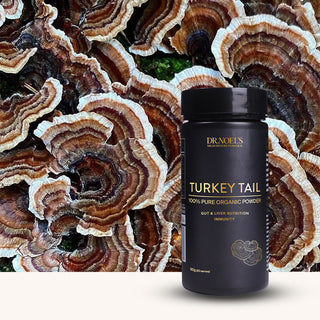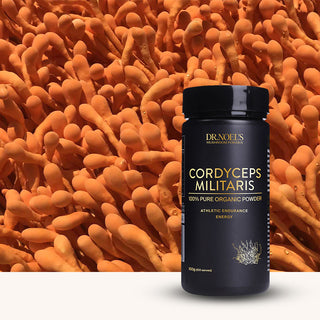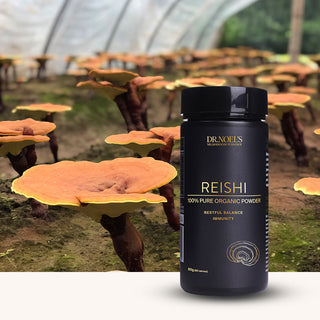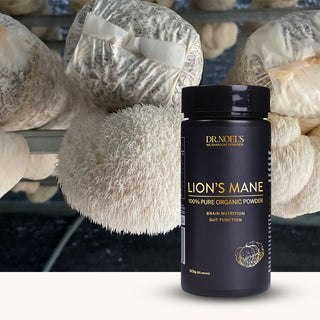Thyroid disease is a common health issue that affects millions of people worldwide. In Australia alone, hyperthyroidism affects around 3 in every 1,000 people, according to Hormones Australia. While there is no definitive cure for thyroid diseases, there are various treatments available that can help manage the condition effectively. Among the emerging natural therapies, medicinal mushrooms—particularly Lion's Mane—are gaining attention for their potential role in supporting thyroid health. This article explores current research on how Lion's Mane mushrooms may contribute to managing thyroid disease, with a focus on understanding its effects rather than making any specific recommendations.
Recommended: Dr Noel's Organic Lion's Mane Powder
What is Thyroid Disease?
The thyroid is a small, butterfly-shaped gland located at the base of the neck. It produces hormones that are crucial for regulating the body's metabolism, including processes like converting food into energy and maintaining body temperature. Imbalances in thyroid hormone levels can significantly impact overall health, influencing weight, heart rate, mood, and more. The most common thyroid-related disorders include:
- Hashimoto’s thyroiditis
- Graves’ disease
- Thyroid cancer
- Thyroid nodules
- Thyroiditis
- Thyroid storm
- Subclinical hypothyroidism
- Goiter
- Thyroid hormone resistance

The precise cause of thyroid disease is still unclear, but several factors can increase the risk:
-
Family history
A history of thyroid disease in the family increases the likelihood of developing the condition. -
Autoimmune diseases
Those with autoimmune conditions like type 1 diabetes or rheumatoid arthritis are at a higher risk. -
Pregnancy
Hormonal changes during pregnancy can trigger thyroid disorders in some women. -
Age
People over the age of 60 are more prone to thyroid problems.
Hyperthyroidism and Hypothyroidism
Thyroid disease can be broadly categorized into two main types: hyperthyroidism and hypothyroidism.
- Hyperthyroidism occurs when the thyroid gland produces an excessive amount of thyroid hormone, leading to symptoms like weight loss, anxiety, irritability, and difficulty sleeping. It affects approximately 0.2% to 1.3% of the global population living in areas with sufficient iodine.
- Hypothyroidism, on the other hand, is characterized by an underactive thyroid gland that does not produce enough hormones. Symptoms may include fatigue, weight gain, constipation, and depression. Hypothyroidism is more prevalent in iodine-deficient regions, affecting about one-third of the world's population. In Europe, the prevalence ranges from 0.2% to 5.3%, while in the United States, it is between 0.3% and 3.7%.
Risks Associated with Thyroid Disease
If left untreated, thyroid disease can lead to severe health complications, including heart failure, osteoporosis, and infertility. In some cases, thyroid disease can even be life-threatening. Therefore, early diagnosis and appropriate management are critical for preventing these outcomes.
Conventional Treatments for Thyroid Disease
The treatment approach for thyroid disease varies depending on whether a person has hyperthyroidism or hypothyroidism. Hyperthyroidism is typically managed through medication or surgical procedures to reduce thyroid hormone production, while hypothyroidism is usually treated with hormone replacement therapy. Additionally, lifestyle changes such as a balanced diet and regular exercise can help manage symptoms. However, it is important to understand that thyroid disease is often a lifelong condition that requires ongoing treatment and monitoring.
Medicinal Mushrooms and Thyroid Health
There is growing interest in the potential health benefits of medicinal mushrooms for managing various conditions, including thyroid disease. Mushrooms like Lion's Mane, reishi, and cordyceps have been used in Traditional Chinese Medicine for centuries and are now being explored in Western medicine for their therapeutic properties.
Can Lion’s Mane Mushroom Improve Thyroid Disease?
Lion’s Mane (Hericium erinaceus) is a unique medicinal mushroom known for its rich profile of bioactive compounds, including antioxidants, beta-glucans, and hericenones, which are noted for their anti-inflammatory and immune-modulating effects. Recent studies suggest that these properties may offer supportive benefits for those with thyroid conditions.

One promising study found that Lion’s Mane extract reduced inflammation in the thyroid gland and alleviated symptoms of Hashimoto’s disease, an autoimmune disorder affecting the thyroid. The polysaccharides extracted from Lion’s Mane were shown to activate and mature dendritic cells—key components of the immune system. This immunomodulatory effect was observed in a 2013 animal-based study conducted in Taiwan, where a concentration of 50 μg/mL of the mushroom polysaccharide stimulated immune cell activity.
Additionally, research has shown that compounds in Lion's Mane can modulate the TH1 immune response, which is often altered in autoimmune thyroid diseases like Hashimoto's thyroiditis. Beta-glucan, a bioactive compound in Lion’s Mane, has demonstrated potential as an immune-potentiating agent, meaning it could help strengthen the immune system.
A 2013 study published in the Korean Journal of Medicinal Crop Science explored the anti-inflammatory and antioxidant effects of Lion’s Mane extract. Researchers discovered that the mushroom extract contributed to cell proliferation and reduced inflammation induced by lipopolysaccharide (LPS), a major bacterial cell wall component that triggers acute inflammatory responses. LPS is also known to activate monocytes and macrophages, cells involved in immune thyroid disorders. The anti-LPS activity of Lion’s Mane may, therefore, have potential implications for preventing and managing such conditions.
The Importance of Choosing High-Quality Lion’s Mane Powders
When considering Lion's Mane as a complementary approach to managing a complex health issue like thyroid disease, the quality of the supplement becomes crucial. Low-quality products may lack the essential bioactive compounds needed to provide the potential benefits discussed in research. Choosing a high-quality Lion’s Mane powder ensures you are getting the full spectrum of beneficial compounds, such as beta-glucans and hericenones, that contribute to its anti-inflammatory and immune-modulating effects. With over 50 years of combined experience and a strong focus on the medicinal properties of mushrooms, Dr Noel's brand is committed to providing the highest quality Lion's Mane powder. Unlike many other supplements on the market, Dr Noel's Lion's Mane is crafted not just as a daily supplement but to support overall health improvements, offering a reliable choice for those looking to benefit from the therapeutic potential of this powerful mushroom.
Understanding the Potential and Limitations
While the findings around Lion’s Mane and its impact on thyroid health are promising, it is crucial to acknowledge that much of the research is still in its early stages. The studies mentioned here provide valuable insights but are not yet conclusive enough to make specific recommendations for using Lion’s Mane as a treatment for thyroid disease. More extensive, human-based clinical trials are needed to fully understand the mushroom's efficacy and safety in this context.
Final Thoughts
Lion’s Mane mushroom shows potential as a complementary approach to managing thyroid disease, particularly due to its anti-inflammatory and immune-modulating properties. For those living with thyroid disorders, these findings offer hope that natural remedies could become a valuable part of a comprehensive health plan in the future. However, it's essential to remember that medicinal mushrooms should not replace conventional treatments.
Always consult your healthcare provider before incorporating any new supplements or natural remedies into your treatment regimen. Medicinal mushrooms like Lion's Mane can be a part of a holistic health program that includes proper nutrition, exercise, and lifestyle changes but should not be a substitute for any medications or treatments prescribed for thyroid disease.





